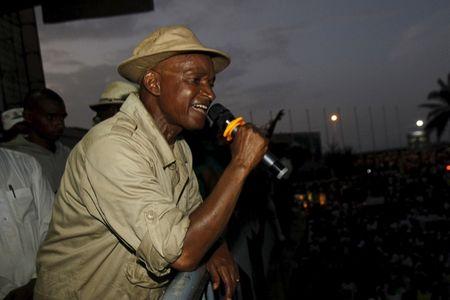Advertisement
Guinea president Conde wins re-election with clear majority
CONAKRY (Reuters) - Guinea's electoral commission on Saturday declared President Alpha Conde winner of an Oct. 11 election to give him a second five-year term.
Conde gained 58 percent of almost 4 million votes cast, avoiding a runoff vote that several observers had said was possible.
Opposition leader Cellou Dalein Diallo won 31 percent. He called for calm, but said he did not recognize the result and would ask his supporters to protest against fraud and rigging.
"The Constitutional Court still needs to render its verdict, but the National Electoral Commission proclaims President Alpha Conde winner in the first round," commission head Bakary Fofana told a news conference.
Candidates have eight days to lodge complaints before the election is ratified by the Constitutional Court. Election observers are yet to pronounce on the vote tallying process, but they said the vote was valid despite logistical problems.
Crowds of Conde supporters took to the streets to celebrate while sporadic gunfire rang out in some neighborhoods. It was unclear whether the shots were a sign of unrest or ruling party activists firing into the air.
Guinea holds one-third of the world's reserves of the aluminum ore bauxite and also produces diamonds and gold. It is relying on mining to boost its economy, estimated by the World Bank at $6.6 billion in 2014, after a slowdown caused by Ebola.
More than 2,500 people have died of Ebola in Guinea since the outbreak was declared in March 2014, from a toll of more than 11,300 in three West African states.
The outbreak has dwindled virtually to zero, but two new cases were declared in Guinea on Friday.
Diallo accused the commission and the government of abuses including ballot stuffing, allowing minors to vote, changing the electoral map and intimidation. But he said he would not appeal to the court.
"Everybody knows this election was a masquerade organized by the electoral commission and the government to declare Alpha Conde the winner in the first round," he told Reuters.
Diallo also said in a statement: "I will invite other candidates and the citizens, who are the real victims of this electoral hold-up, to organize peaceful demonstrations in accordance with the law to express our outrage."
In a country with a history of political violence, several people were killed in election-related clashes. But the margin of Conde's victory may make it harder for Diallo's accusations to gain traction.
Conde took power in 2010, ending two years of military rule during which security forces massacred more than 150 people at a stadium in the capital. Guinea gained independence from France in 1958 and from then until 2008 it was ruled by only two presidents, both of whom were authoritarian.
(Writing by Matthew Mpoke Bigg; Editing by Kevin Liffey and Matthew Lewis)



















Add new comment